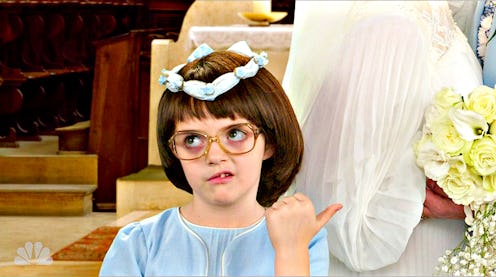Life
3 Reasons Uncool Kids Make Awesome Adults

You've probably heard it before: "Be careful of who you call 'loser' or 'nerd,' because you'll probably be calling them 'boss' one day." It seems like some very primal sort of reverse-psychology: Coolness is associated with effortlessness, and kids who are smart and driven are the opposite of that. It's as though the kids who instinctively see themselves as underdogs want to define themselves as superior while they still hold the power.
It's a pattern you've undoubtedly seen in your own life: The kids who weren't cool excelled as adults; the kids who were are still in their hometowns, still trying to ride out the aftershocks of their peak. The New York Times recently reported on a study published in the Journal of Child Development that essentially demonstrates that kids who engage in pseudo-mature behavior tend to get lost in it, still living to "act cool," impress peers, and generally seem "bad" (read: "good," or elusively exclusive).
As experience has shown us and research is starting to confirm, kids who weren't cool in school get much farther ahead as adults, so maybe a few years of awkward lunch table encounters was worth it, if the exchange is a lifelong disposition to succeed. Here, all the reasons why the underdogs became the success stories — from my personal experience, hopefully to yours:
What's Often Considered "Cool" As An Adolescent In Profoundly Uncool As An Adult
Think back to when you first understood who was cool and who wasn't, and what behaviors those kids engaged in. They were the ones who were having sex at a young age, drinking irresponsibly, blowing off school, throwing parties, being recklessly social and "grown up." But they weren't actually mature. They were acting out on what they thought liberated adults did, in an effort to escape their own emotional turmoil. The truth is that they weren't sexually liberated; they were prematurely seeking personal affirmation through a partner. They weren't "relaxing" and drinking for fun, they were drinking for status, or worse, to be numb. They weren't social and carefree because they were uninhibited and independently-minded; they were falling out from under the pressure to succeed in a way they felt incapable.
Kids Who Peak At A Young Age Usually Try To Maintain That Peak Far Into Adulthood
Hence the people still living in their hometowns, drinking in the woods on the weekends, and putting off their ambitions. Now, let's not get this twisted: a lot of very successful young adults live at home for financial reasons, there's nothing wrong taking your time, and drinking in the woods is probably fun. Those are symptoms, not issues, and the issue here is that these kids aren't staying home to be fiscally conservative or anything — they're doing it because there are few, if any, other options open to them, and fewer still that they'd be aware of. All they've known is the bubble they grew up in. In a sense, they cheated themselves out of the possibility of choosing a new life, by never going to see what was out there in the first place.
Uncool Kids Still Want A Sort Of Revenge
It may not be the healthiest way to approach some deep-seeded childhood issues, but it's also not completely unproductive, either: The kids who felt constantly teased and "lesser than" want to come out on top, in a far more gratifying way than having been able to drink without parental supervision at the age of 16 would bring. Holding a grudge, or seeking a sort of subconscious revenge, is not usually a positive thing, no — but in this case, it seems to be proving better than the alternative.
Images: NBC; Giphy(3)